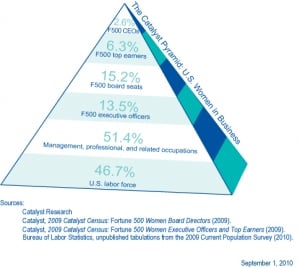Sponsorship vs. Mentorship
Sponsorship is getting the Mentees in your program promoted and/or finding internal support for your mentor program. White paper available
Sponsorship vs mentorship, a response to HBR on Why Men Still Get More Promotions Than Women. Blog by top provider of corporate mentoring tools.
This month’s Harvard Business Review has an article Why Men Still Get More Promotions Than Women  which discussed sponsorship vs mentorship. The HBR article prompted us to reflect on the pyramid of women in American business. Women represent over half of all managers at fifty-one percent, yet less than fourteen percent of executive officers in Fortune 500 companies are women.
which discussed sponsorship vs mentorship. The HBR article prompted us to reflect on the pyramid of women in American business. Women represent over half of all managers at fifty-one percent, yet less than fourteen percent of executive officers in Fortune 500 companies are women.
Herminia Ibarra (from INSEAD) and Nancy Carter and Christine Silva (both of Catalyst) believe there is a difference between sponsorship and mentorship.
Mentors were expected to provide psychosocial and career support. Most mentors focus on personal and professional development.
Sponsorship, by contrast, involves advocating for advancement. Without sponsorship, a person is less likely to be promoted, even if they are high-potential. Research by Kathy Kram suggests that someone is likely to be overlooked for promotion regardless of his or her competence and performance. This is especially true for managers at mid-career and beyond.
Mentors and Sponsors: How They Differ
Mentors
Sponsors
The article on sponsorship vs mentorship ended on a positive note: Women in formal mentoring programs were more likely to win promotions than those who had found their own mentors.
So, while firms are only beginning to have clear sponsorship expectations from mentors in their high-potential programs, some sponsorship was occurring. In one example cited, IBM Europe has a clearly defined sponsorship program for senior women below the executive level. Sponsors are expected to get their candidates ready to for the next level within a year. Failure to obtain a promotion is viewed as a failure of the sponsor, not of the candidate.
We would like to talk to you about sponsorship and mentorship and how our software tools can help your firm its strategic talent development goals - using both sponsorship and mentorship.
Mentor Resources is the premier provider of tools for formal mentoring programs, using WisdomShare® an artificial-intelligence matching system. Our goal with each client is to help them develop mentoring programs which combining the best match with clear guidance and measurable goals which are strategically accretive to the organizations’ long-term goals.
Our clients include Fortune 1000 companies, professional associations, government departments and non-profit organizations and university alumni associations.
Sponsorship is getting the Mentees in your program promoted and/or finding internal support for your mentor program. White paper available
Mentor Resources has tools for managing a mentor program, including mentoring software preferred by experienced mentor program administators.
Cisco’s Reverse Mentoring Program had great success. Learn more about Reverse Mentoring Programs.
Be the first to know about news, articles, learning resources and new feature updates of Wisdom Share to help you build or refine your mentoring program with the tools and knowledge of today’s industry.